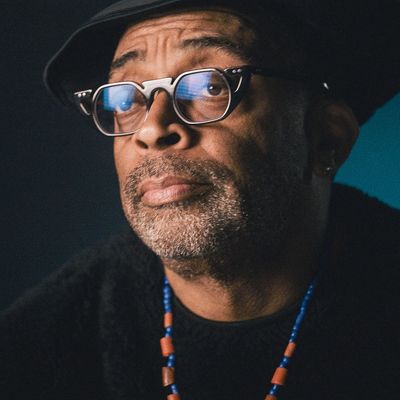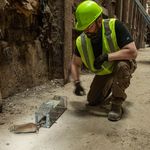
Spike Lee’s documentaries usually take the form of visual essays, with the vociferous filmmaker making his voice heard from behind the camera (and occasionally in front of it) and outlining where he personally stands on an issue. He’s hardly the only documentarian to take this approach. The French critic and filmmaker Alexandre Astruc long ago coined the term camera-stylo, or “camera-pen,” suggesting that filmmakers can and should wield their cameras the way writers use their pens.
None of which fully explains his latest undertaking, NYC Epicenters 9/11–2021 ½. Lee’s 7.5-hour docuseries, the first episode of which has already aired on HBO, attempts the daunting task of addressing both the COVID-19 pandemic and the 9/11 attacks — particularly, New York’s response to these bookend tragedies over the course of two decades. As you may have heard, the series courted controversy, with critics claiming that Lee’s docuseries lends outsize credence to the ideas of the conspiracy group Architects & Engineers for 9/11 Truth. In an interview with the New York Times, Lee referenced the debunked “jet fuel can’t melt steel beams” myth, adding, “My approach is put the information in the movie and let people decide for themselves. I respect the intelligence of the audience.” However, after those with early access to the fourth episode of Epicenters noted that Lee seems to be in agreement with the conspiracy group, Lee and HBO have seemingly course-corrected before most of the docuseries has even aired, reediting the final episode and asking critics to reserve their judgment until they see the final cut.
Ahead of the finale, set to air on September 11, HBO subscribers and longtime Lee fans may have questions, among them: What is this docuseries even about? What is actually going on in the now-controversial fourth episode? And what do the Boston Red Sox have to do with COVID-19? After watching the whole series, we have some answers at the ready.
First off, what is Epicenters About?
The first two episodes of Epicenters deal with New York’s resilience as the American epicenter of COVID-19 and the ways in which the crisis escalated under the Trump administration. The final two episodes are also about New York’s resilience, this time in the face of the 9/11 attacks and the toxic air that circulated around Ground Zero thereafter.
Okay, so what happens in the fourth episode that’s so controversial?
The original version of Epicenters, episode four, devoted about 30 minutes to the theories of Architects & Engineers for 9/11 Truth and the group’s founder, Richard Gage. The group has long propagated the thoroughly debunked theory that the collapse of the World Trade Center was an inside job executed by controlled demolition. At various times, Gage has also claimed that Israel was lurking in the background of 9/11 and that COVID-19 is a hoax. Lee himself seemed to lend credence to the inside-job theory both in the series and in the interview with the Times. “The amount of heat that it takes to make steel melt, that temperature’s not reached,” he told the Times. “And then the juxtaposition of the way Building 7 fell to the ground — when you put it next to other building collapses that were demolitions, it’s like you’re looking at the same thing.”
The response to Lee’s supposed endorsement was swift, as was Lee’s decision to return to the editing room, where he removed the offending section entirely (the fourth and final episode now runs 90 minutes, trimmed down from its original two hours). Yet the question remains: What was he thinking, and how did the segment make it into the final cut to begin with? Lee and HBO have yet to comment, but two parents of 9/11 victims who subscribe to the inside-job theory released their own statement after Lee made his edits, decrying the series’s “censorship.”
Wait, does Lee have a history of endorsing conspiracy theories?
As the Washington Post pointed out, in his documentary When the Levees Broke, Lee speculated that the New Orleans levees were intentionally blown up during Hurricane Katrina to flood poor Black communities.
All right. So what is the overall tone of Epicenters?
Despite the serious subject matter, Lee’s docuseries is often irreverent. The filmmaker has a lot of fun with big red letters that flash on screen to identify people and places — Donald Trump is “President Agent Orange” (a moniker Lee borrowed from the rapper Busta Rhymes, an interview subject in the series), the Bronx is “Da Boogie Down Bronx (a popular nickname for the borough), Brooklyn is “Da People’s Republic of Brooklyn.” “The pile,” the mountain of twisted metal and devastation where the Twin Towers once stood, is simply “Da Pile.”
And it’s full of familiar Leeisms. Epicenters is about five minutes old when the director (loudly) asks a Bronx doctor about all the injured Red Sox fans that must make their way through the hospital when the team is in town to play the Yankees (Lee’s favorite baseball team). Later, he razzes New York City mayor Bill de Blasio about his Red Sox fandom. “You can’t give it up, can you, Spike?” the mayor responds. No, he can’t. And what does this have to do with anything? Nothing, really. But Lee sees much of the world through the lens of athletics (later in the series, he recalls how he gave his wife’s courtside Knicks ticket to the daughter of a fallen New York City firefighter) so he often uses sports talk as a lingua franca, a way to loosen up his interview subjects, who are here to discuss heavier things.
Epicenters is also cinematic. Because Lee isn’t just a filmmaker: He’s a student of film (famously, he studied at NYU). So the docuseries involves a lot of film references and clips: There’s the rousing “New York, New York” number from On the Town, featuring Frank Sinatra, Gene Kelly, and Jules Munshin, shown in its entirety. There’s Charlie Chaplin’s The Great Dictator, used as a commentary on Trump. There are clips from some of Lee’s own films, including School Daze and Do the Right Thing, the latter intercut with real-life scenes of police violence against Black men. Most movingly, there’s the climax of On the Waterfront, in which Marlon Brando’s Terry Malloy, beaten to a pulp, gets up off the ground and leads his fellow dockworkers back to work as Leonard Bernstein’s muscular score surges in the background. Terry is Lee’s surrogate for New York, bruised and battered but indefatigable and always ready to bounce back.
How does Epicenters compare to his past feature films or documentary work?
It’s his biggest and most ambitious work, fiction or nonfiction. To give some perspective: When the Levees Broke, previously seen as his documentary epic, has about half the running time of Epicenters. 4 Little Girls, his doc on the white-terrorist bombing of a Black Alabama church, clocks in at under two hours.
So if I haven’t wanted Epicenters yet, should I?
Yes. Lee’s love for the city has been front and center in several of his New York–set films, including Do the Right Thing, Crooklyn, and The 25th Hour (which remains the greatest of all 9/11 movies, but that’s another story). But he’s never had this big of a canvas to paint on. Epicenters gives all of his documentary filmmaking quirks — from the sports talk to the shouted questions to the nicknames — space to breathe. Moreover, if you’re interested in the subject matter, Lee interviewed more than 200 people, representing New York in all its diversity: firemen and -women, artists, flight attendants, doctors, reporters, filmmakers, actors, maintenance workers, construction workers, and on and on. This mosaic of faces and voices amounts to vital social history — a document that people will look at years from now to better understand these topsy-turvy times. We might never know what happened with the fourth episode or Lee’s decision to endorse and then seemingly discount conspiracy theories about 9/11, but the remaining minutes of this docuseries are well worth experiencing.




